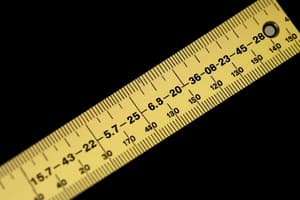Podcast
Questions and Answers
What is the SI unit for mass?
What is the SI unit for mass?
- Kilogram (correct)
- Pound
- Milligram
- Gram
Which statement best describes scientific notation?
Which statement best describes scientific notation?
- It is not commonly used in scientific language.
- It is only applicable in non-SI units.
- It is used only for large measurements.
- It can represent both very large and very small measurements. (correct)
What does density serve as in scientific calculations?
What does density serve as in scientific calculations?
- A measure of volume
- A conversion factor (correct)
- A temperature scale
- A mass unit
Which of the following is NOT one of the seven fundamental units?
Which of the following is NOT one of the seven fundamental units?
Why are units important in scientific measurements?
Why are units important in scientific measurements?
What is the purpose of converting between SI and non-SI units?
What is the purpose of converting between SI and non-SI units?
In scientific practice, what does using a calculator help with?
In scientific practice, what does using a calculator help with?
How is speed commonly used in scientific measurements?
How is speed commonly used in scientific measurements?
What is the common unit for measuring small volumes in scientific experiments?
What is the common unit for measuring small volumes in scientific experiments?
What is the standard notation for 1.528 x 10^5 kg?
What is the standard notation for 1.528 x 10^5 kg?
Which of the following represents the number 1.64 x 10^7 L in standard notation?
Which of the following represents the number 1.64 x 10^7 L in standard notation?
How is 1.35 x 10^-5 m expressed in standard notation?
How is 1.35 x 10^-5 m expressed in standard notation?
If 8.28 x 10^-3 g is converted to standard notation, what is the result?
If 8.28 x 10^-3 g is converted to standard notation, what is the result?
When converting 0.0000032 grams to scientific notation, what is the correct representation?
When converting 0.0000032 grams to scientific notation, what is the correct representation?
What is the number of bits in 160,000,000 bits expressed in megabits?
What is the number of bits in 160,000,000 bits expressed in megabits?
What is the smallest measurement from the content provided?
What is the smallest measurement from the content provided?
What unit measurement is given for $21.99?
What unit measurement is given for $21.99?
In scientific notation, how is the measurement 200 g expressed?
In scientific notation, how is the measurement 200 g expressed?
In the context of the content, how is 0.0000032 grams also referred to?
In the context of the content, how is 0.0000032 grams also referred to?
What is the formula to calculate density?
What is the formula to calculate density?
What would be the mass of a block of aluminum with a volume of 1.32 L if its density is 2.70 g/mL?
What would be the mass of a block of aluminum with a volume of 1.32 L if its density is 2.70 g/mL?
What is the density of a gas that has a mass of 1.60 g and fills a volume of 1200 mL?
What is the density of a gas that has a mass of 1.60 g and fills a volume of 1200 mL?
If an antifreeze mixture has a density of 1.06 g/mL, what volume will 600 g of this solution occupy?
If an antifreeze mixture has a density of 1.06 g/mL, what volume will 600 g of this solution occupy?
What is the mass of an 8.0 cm³ cube of pure silver if its density is 10.5 g/cm³?
What is the mass of an 8.0 cm³ cube of pure silver if its density is 10.5 g/cm³?
In scientific notation, what is the conversion of $21.99$?
In scientific notation, what is the conversion of $21.99$?
What are the two components of all measurements?
What are the two components of all measurements?
Which of the following is a key feature of scientific notation?
Which of the following is a key feature of scientific notation?
What method is essential for converting between SI unit prefixes?
What method is essential for converting between SI unit prefixes?
What does the scientific notation $5.1 x 10^{-2}$ represent?
What does the scientific notation $5.1 x 10^{-2}$ represent?
How many digits do you move when converting $2,500,000$ L to scientific notation?
How many digits do you move when converting $2,500,000$ L to scientific notation?
What is the value of $10^{-3}$?
What is the value of $10^{-3}$?
What does moving a decimal point to the right signify in scientific notation?
What does moving a decimal point to the right signify in scientific notation?
The scientific notation for $137,000,000,000$ J is:
The scientific notation for $137,000,000,000$ J is:
What is the scientific notation equivalent of $0.000326$ cm?
What is the scientific notation equivalent of $0.000326$ cm?
What is the purpose of using SI unit prefixes?
What is the purpose of using SI unit prefixes?
What is the mass of a copper pellet that is 231 mg in grams?
What is the mass of a copper pellet that is 231 mg in grams?
How many liters of IV fluid does a patient receive in one day if administered at a rate of 95.0 cm³ per hour?
How many liters of IV fluid does a patient receive in one day if administered at a rate of 95.0 cm³ per hour?
How many nanoseconds are there in 2 hours?
How many nanoseconds are there in 2 hours?
What is the speed of light, given as 3.00 x 10^8 m/s, converted to miles per hour?
What is the speed of light, given as 3.00 x 10^8 m/s, converted to miles per hour?
Which of the following conversion factors can be used to convert 1 cm³ to liters?
Which of the following conversion factors can be used to convert 1 cm³ to liters?
How many seconds are there in one day?
How many seconds are there in one day?
What is the equivalent of 1,000 mL in cubic centimeters?
What is the equivalent of 1,000 mL in cubic centimeters?
When converting units, how should one treat these units?
When converting units, how should one treat these units?
If you need to convert hours to seconds, which factor is necessary?
If you need to convert hours to seconds, which factor is necessary?
What does 'cm³' directly relate to in volume conversions?
What does 'cm³' directly relate to in volume conversions?
Flashcards are hidden until you start studying
Study Notes
Learning Objectives
- Identify the seven fundamental units in science.
- Rewrite numbers using scientific notation and convert back to standard form.
- Convert between various SI (International System of Units) and non-SI units.
- Utilize density and speed as conversion factors.
- Connect measurements with laboratory practices.
Measurements and Units
- Units of measurement communicate quantities and accepted values, such as "10 seconds" or "12 centimeters."
- Essential to consider both numbers and units together in scientific language.
Fundamental Units
- Seven fundamental units exist in chemistry, with the most common mass unit being "grams," while the SI unit is "kilograms."
- Fundamental units form the basis for all other measurements in chemistry.
Scientific Notation
- Scientific notation facilitates representation of very large or small numbers.
- Hydrothermal worm measures 0.0005 meters; Earth to Sun distance is 149,600,000,000 meters.
- Scientific notation example: 5.1 x 10² = 510 and 5.1 x 10⁻² = 0.051.
Conversion Techniques
- Utilize scientific notation to simplify conversions, e.g., 2,500,000 L = 2.5 x 10⁶ L.
- Dimensional analysis employs ratios of units for conversion, treating units like algebraic expressions.
- Units cancel during conversion, ensuring accuracy, such as converting 231 mg to grams.
Practical Applications
- Density, defined as mass per unit volume (d = m/V), is a critical conversion factor in laboratory settings.
- Example: Aluminum density of 2.70 g/mL; how mass and volume relate through this factor.
- Calculating gas density from measured mass and volume for practical understanding of gas behavior.
Exercises and Practice
- Students should engage in practice problems involving scientific notation and unit conversions.
- Homework includes finding the largest and smallest numbers in their environment, determining units, and converting to scientific notation.
Studying That Suits You
Use AI to generate personalized quizzes and flashcards to suit your learning preferences.




